A Study of Achille-Claude Debussy's Influence on Music Composition
VerifiedAdded on 2021/09/13
|7
|1515
|125
Essay
AI Summary
This essay examines the significant influence of Achille-Claude Debussy, a pivotal French composer of the late 19th and early 20th centuries, often associated with Impressionism. The essay discusses Debussy's early musical talent and his education at the Conservatoire de Paris, highlighting his development of a unique compositional style. It delves into his major works, including operas and orchestral pieces, and explores the influences on his music, such as Far Eastern music and the Russian orchestra. The essay also addresses critical reception of his work, including debates over his harmonic innovations, and references composers who influenced his style. The analysis further investigates the synthesis of music and stage action in opera, examining the poetics of drama, epic, and fairy tales as they relate to Debussy's compositions. The essay provides a comprehensive overview of Debussy's impact on music, his compositional techniques, and the lasting influence of his work.
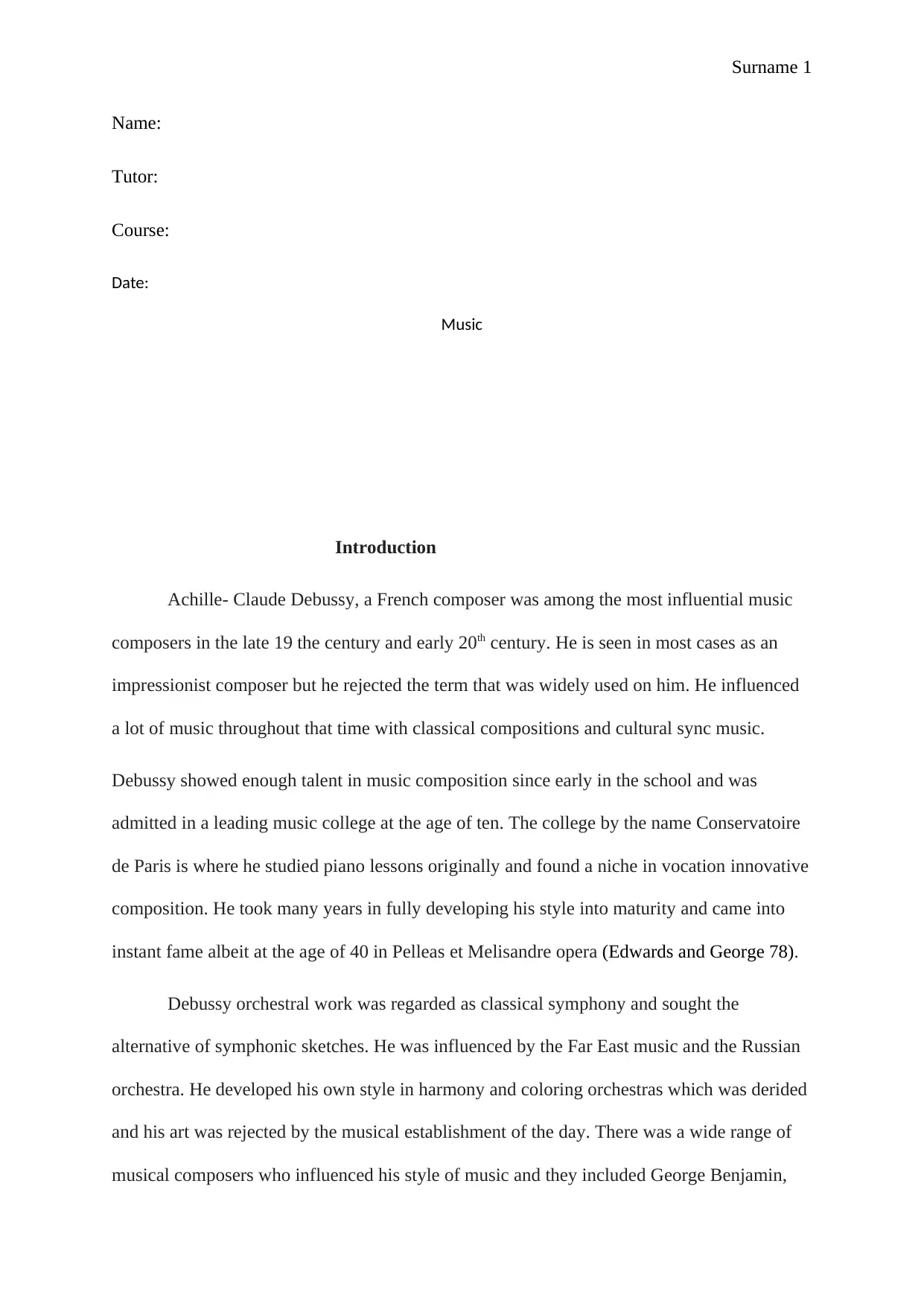
Surname 1
Name:
Tutor:
Course:
Date:
Music
Introduction
Achille- Claude Debussy, a French composer was among the most influential music
composers in the late 19 the century and early 20th century. He is seen in most cases as an
impressionist composer but he rejected the term that was widely used on him. He influenced
a lot of music throughout that time with classical compositions and cultural sync music.
Debussy showed enough talent in music composition since early in the school and was
admitted in a leading music college at the age of ten. The college by the name Conservatoire
de Paris is where he studied piano lessons originally and found a niche in vocation innovative
composition. He took many years in fully developing his style into maturity and came into
instant fame albeit at the age of 40 in Pelleas et Melisandre opera (Edwards and George 78).
Debussy orchestral work was regarded as classical symphony and sought the
alternative of symphonic sketches. He was influenced by the Far East music and the Russian
orchestra. He developed his own style in harmony and coloring orchestras which was derided
and his art was rejected by the musical establishment of the day. There was a wide range of
musical composers who influenced his style of music and they included George Benjamin,
Name:
Tutor:
Course:
Date:
Music
Introduction
Achille- Claude Debussy, a French composer was among the most influential music
composers in the late 19 the century and early 20th century. He is seen in most cases as an
impressionist composer but he rejected the term that was widely used on him. He influenced
a lot of music throughout that time with classical compositions and cultural sync music.
Debussy showed enough talent in music composition since early in the school and was
admitted in a leading music college at the age of ten. The college by the name Conservatoire
de Paris is where he studied piano lessons originally and found a niche in vocation innovative
composition. He took many years in fully developing his style into maturity and came into
instant fame albeit at the age of 40 in Pelleas et Melisandre opera (Edwards and George 78).
Debussy orchestral work was regarded as classical symphony and sought the
alternative of symphonic sketches. He was influenced by the Far East music and the Russian
orchestra. He developed his own style in harmony and coloring orchestras which was derided
and his art was rejected by the musical establishment of the day. There was a wide range of
musical composers who influenced his style of music and they included George Benjamin,
Paraphrase This Document
Need a fresh take? Get an instant paraphrase of this document with our AI Paraphraser
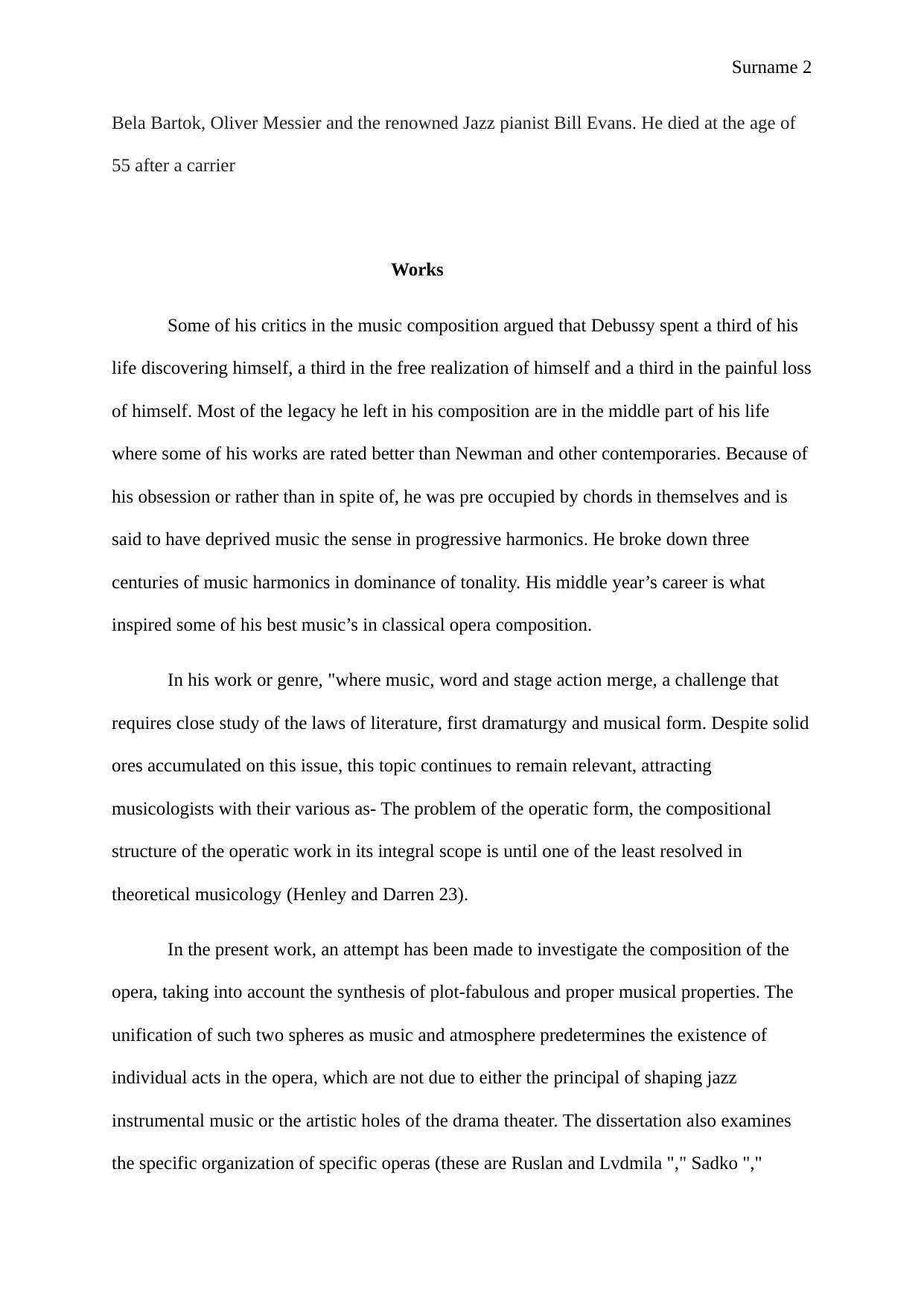
Surname 2
Bela Bartok, Oliver Messier and the renowned Jazz pianist Bill Evans. He died at the age of
55 after a carrier
Works
Some of his critics in the music composition argued that Debussy spent a third of his
life discovering himself, a third in the free realization of himself and a third in the painful loss
of himself. Most of the legacy he left in his composition are in the middle part of his life
where some of his works are rated better than Newman and other contemporaries. Because of
his obsession or rather than in spite of, he was pre occupied by chords in themselves and is
said to have deprived music the sense in progressive harmonics. He broke down three
centuries of music harmonics in dominance of tonality. His middle year’s career is what
inspired some of his best music’s in classical opera composition.
In his work or genre, "where music, word and stage action merge, a challenge that
requires close study of the laws of literature, first dramaturgy and musical form. Despite solid
ores accumulated on this issue, this topic continues to remain relevant, attracting
musicologists with their various as- The problem of the operatic form, the compositional
structure of the operatic work in its integral scope is until one of the least resolved in
theoretical musicology (Henley and Darren 23).
In the present work, an attempt has been made to investigate the composition of the
opera, taking into account the synthesis of plot-fabulous and proper musical properties. The
unification of such two spheres as music and atmosphere predetermines the existence of
individual acts in the opera, which are not due to either the principal of shaping jazz
instrumental music or the artistic holes of the drama theater. The dissertation also examines
the specific organization of specific operas (these are Ruslan and Lvdmila "," Sadko ","
Bela Bartok, Oliver Messier and the renowned Jazz pianist Bill Evans. He died at the age of
55 after a carrier
Works
Some of his critics in the music composition argued that Debussy spent a third of his
life discovering himself, a third in the free realization of himself and a third in the painful loss
of himself. Most of the legacy he left in his composition are in the middle part of his life
where some of his works are rated better than Newman and other contemporaries. Because of
his obsession or rather than in spite of, he was pre occupied by chords in themselves and is
said to have deprived music the sense in progressive harmonics. He broke down three
centuries of music harmonics in dominance of tonality. His middle year’s career is what
inspired some of his best music’s in classical opera composition.
In his work or genre, "where music, word and stage action merge, a challenge that
requires close study of the laws of literature, first dramaturgy and musical form. Despite solid
ores accumulated on this issue, this topic continues to remain relevant, attracting
musicologists with their various as- The problem of the operatic form, the compositional
structure of the operatic work in its integral scope is until one of the least resolved in
theoretical musicology (Henley and Darren 23).
In the present work, an attempt has been made to investigate the composition of the
opera, taking into account the synthesis of plot-fabulous and proper musical properties. The
unification of such two spheres as music and atmosphere predetermines the existence of
individual acts in the opera, which are not due to either the principal of shaping jazz
instrumental music or the artistic holes of the drama theater. The dissertation also examines
the specific organization of specific operas (these are Ruslan and Lvdmila "," Sadko ","
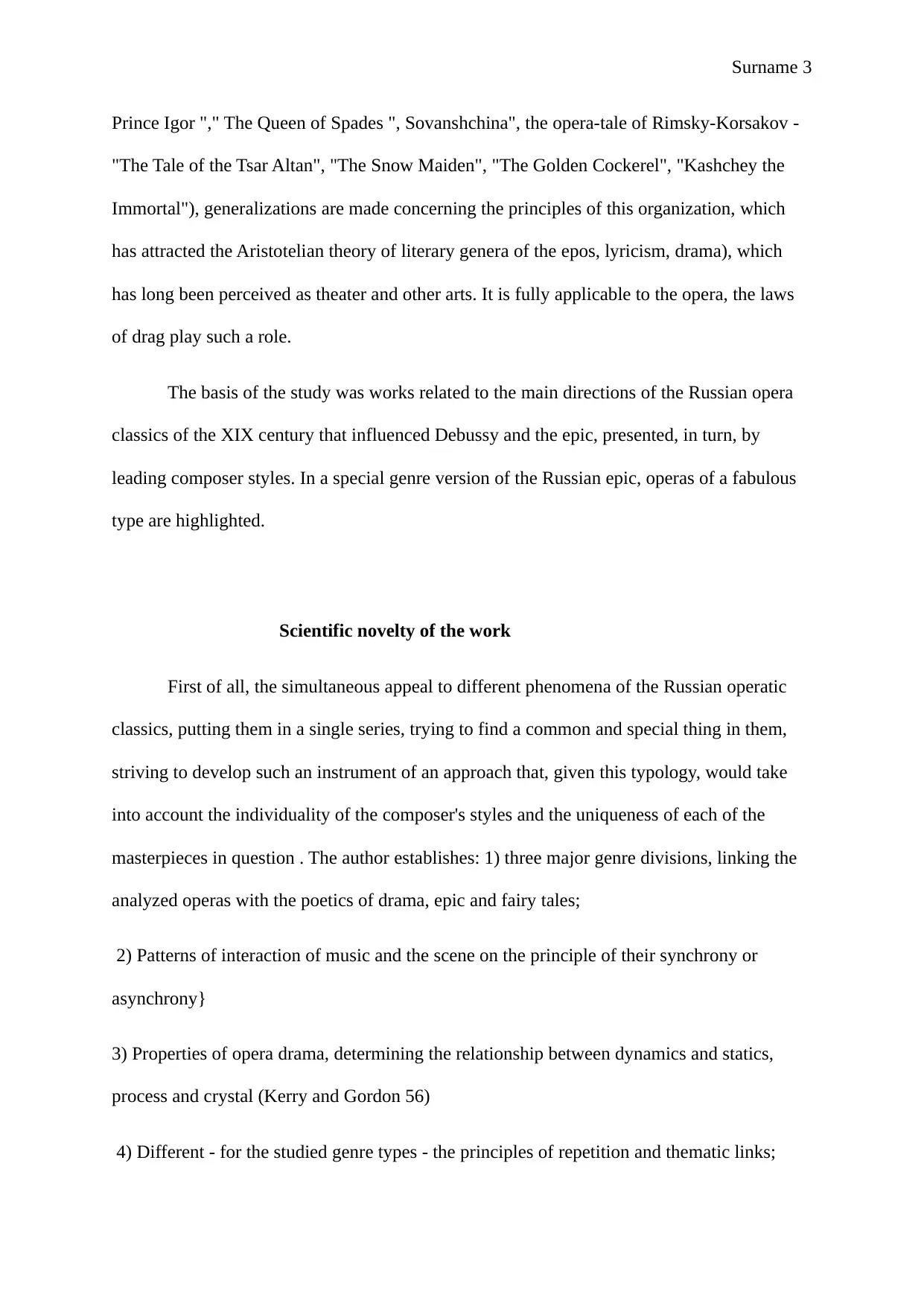
Surname 3
Prince Igor "," The Queen of Spades ", Sovanshchina", the opera-tale of Rimsky-Korsakov -
"The Tale of the Tsar Altan", "The Snow Maiden", "The Golden Cockerel", "Kashchey the
Immortal"), generalizations are made concerning the principles of this organization, which
has attracted the Aristotelian theory of literary genera of the epos, lyricism, drama), which
has long been perceived as theater and other arts. It is fully applicable to the opera, the laws
of drag play such a role.
The basis of the study was works related to the main directions of the Russian opera
classics of the XIX century that influenced Debussy and the epic, presented, in turn, by
leading composer styles. In a special genre version of the Russian epic, operas of a fabulous
type are highlighted.
Scientific novelty of the work
First of all, the simultaneous appeal to different phenomena of the Russian operatic
classics, putting them in a single series, trying to find a common and special thing in them,
striving to develop such an instrument of an approach that, given this typology, would take
into account the individuality of the composer's styles and the uniqueness of each of the
masterpieces in question . The author establishes: 1) three major genre divisions, linking the
analyzed operas with the poetics of drama, epic and fairy tales;
2) Patterns of interaction of music and the scene on the principle of their synchrony or
asynchrony}
3) Properties of opera drama, determining the relationship between dynamics and statics,
process and crystal (Kerry and Gordon 56)
4) Different - for the studied genre types - the principles of repetition and thematic links;
Prince Igor "," The Queen of Spades ", Sovanshchina", the opera-tale of Rimsky-Korsakov -
"The Tale of the Tsar Altan", "The Snow Maiden", "The Golden Cockerel", "Kashchey the
Immortal"), generalizations are made concerning the principles of this organization, which
has attracted the Aristotelian theory of literary genera of the epos, lyricism, drama), which
has long been perceived as theater and other arts. It is fully applicable to the opera, the laws
of drag play such a role.
The basis of the study was works related to the main directions of the Russian opera
classics of the XIX century that influenced Debussy and the epic, presented, in turn, by
leading composer styles. In a special genre version of the Russian epic, operas of a fabulous
type are highlighted.
Scientific novelty of the work
First of all, the simultaneous appeal to different phenomena of the Russian operatic
classics, putting them in a single series, trying to find a common and special thing in them,
striving to develop such an instrument of an approach that, given this typology, would take
into account the individuality of the composer's styles and the uniqueness of each of the
masterpieces in question . The author establishes: 1) three major genre divisions, linking the
analyzed operas with the poetics of drama, epic and fairy tales;
2) Patterns of interaction of music and the scene on the principle of their synchrony or
asynchrony}
3) Properties of opera drama, determining the relationship between dynamics and statics,
process and crystal (Kerry and Gordon 56)
4) Different - for the studied genre types - the principles of repetition and thematic links;
⊘ This is a preview!⊘
Do you want full access?
Subscribe today to unlock all pages.

Trusted by 1+ million students worldwide
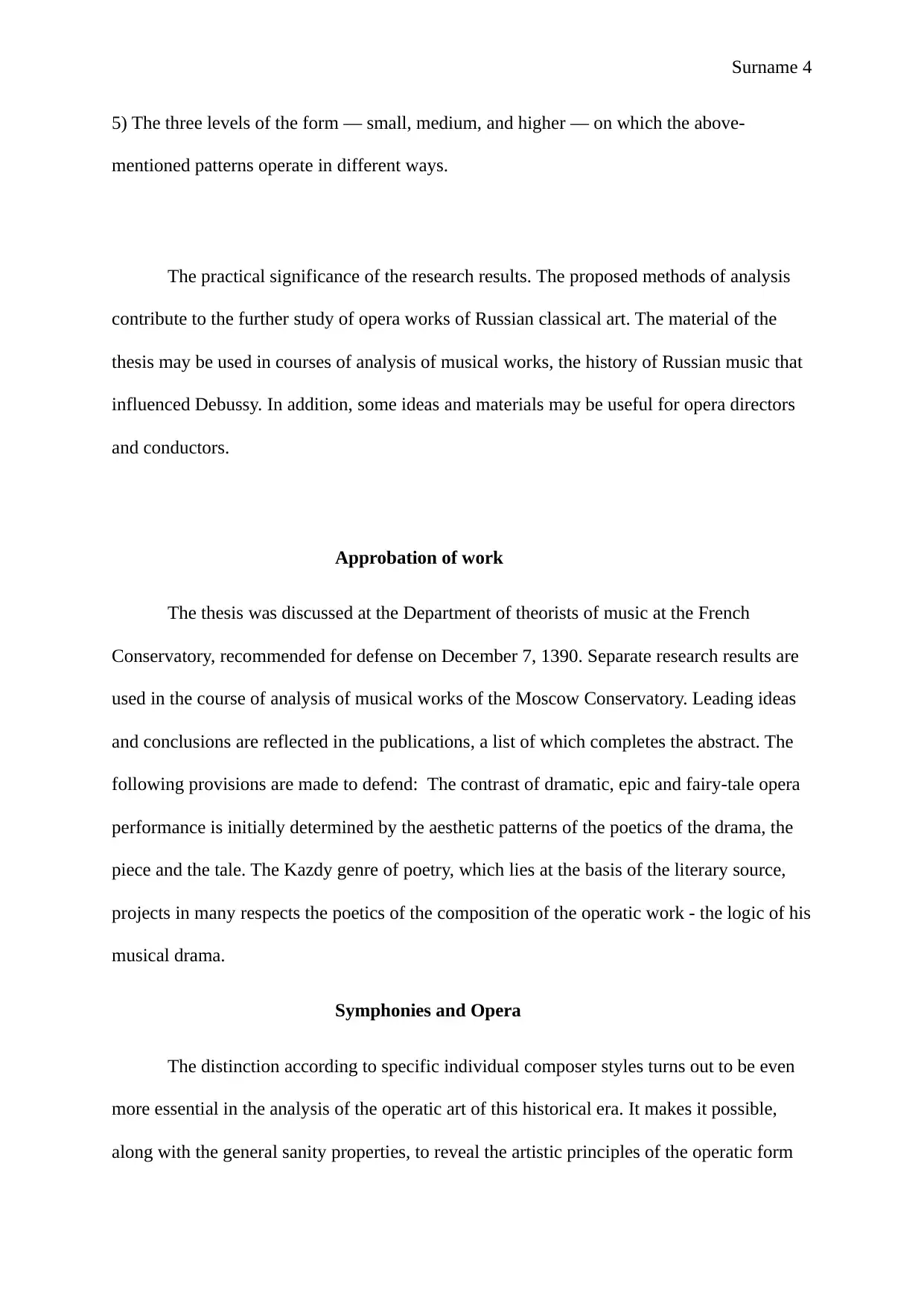
Surname 4
5) The three levels of the form — small, medium, and higher — on which the above-
mentioned patterns operate in different ways.
The practical significance of the research results. The proposed methods of analysis
contribute to the further study of opera works of Russian classical art. The material of the
thesis may be used in courses of analysis of musical works, the history of Russian music that
influenced Debussy. In addition, some ideas and materials may be useful for opera directors
and conductors.
Approbation of work
The thesis was discussed at the Department of theorists of music at the French
Conservatory, recommended for defense on December 7, 1390. Separate research results are
used in the course of analysis of musical works of the Moscow Conservatory. Leading ideas
and conclusions are reflected in the publications, a list of which completes the abstract. The
following provisions are made to defend: The contrast of dramatic, epic and fairy-tale opera
performance is initially determined by the aesthetic patterns of the poetics of the drama, the
piece and the tale. The Kazdy genre of poetry, which lies at the basis of the literary source,
projects in many respects the poetics of the composition of the operatic work - the logic of his
musical drama.
Symphonies and Opera
The distinction according to specific individual composer styles turns out to be even
more essential in the analysis of the operatic art of this historical era. It makes it possible,
along with the general sanity properties, to reveal the artistic principles of the operatic form
5) The three levels of the form — small, medium, and higher — on which the above-
mentioned patterns operate in different ways.
The practical significance of the research results. The proposed methods of analysis
contribute to the further study of opera works of Russian classical art. The material of the
thesis may be used in courses of analysis of musical works, the history of Russian music that
influenced Debussy. In addition, some ideas and materials may be useful for opera directors
and conductors.
Approbation of work
The thesis was discussed at the Department of theorists of music at the French
Conservatory, recommended for defense on December 7, 1390. Separate research results are
used in the course of analysis of musical works of the Moscow Conservatory. Leading ideas
and conclusions are reflected in the publications, a list of which completes the abstract. The
following provisions are made to defend: The contrast of dramatic, epic and fairy-tale opera
performance is initially determined by the aesthetic patterns of the poetics of the drama, the
piece and the tale. The Kazdy genre of poetry, which lies at the basis of the literary source,
projects in many respects the poetics of the composition of the operatic work - the logic of his
musical drama.
Symphonies and Opera
The distinction according to specific individual composer styles turns out to be even
more essential in the analysis of the operatic art of this historical era. It makes it possible,
along with the general sanity properties, to reveal the artistic principles of the operatic form
Paraphrase This Document
Need a fresh take? Get an instant paraphrase of this document with our AI Paraphraser
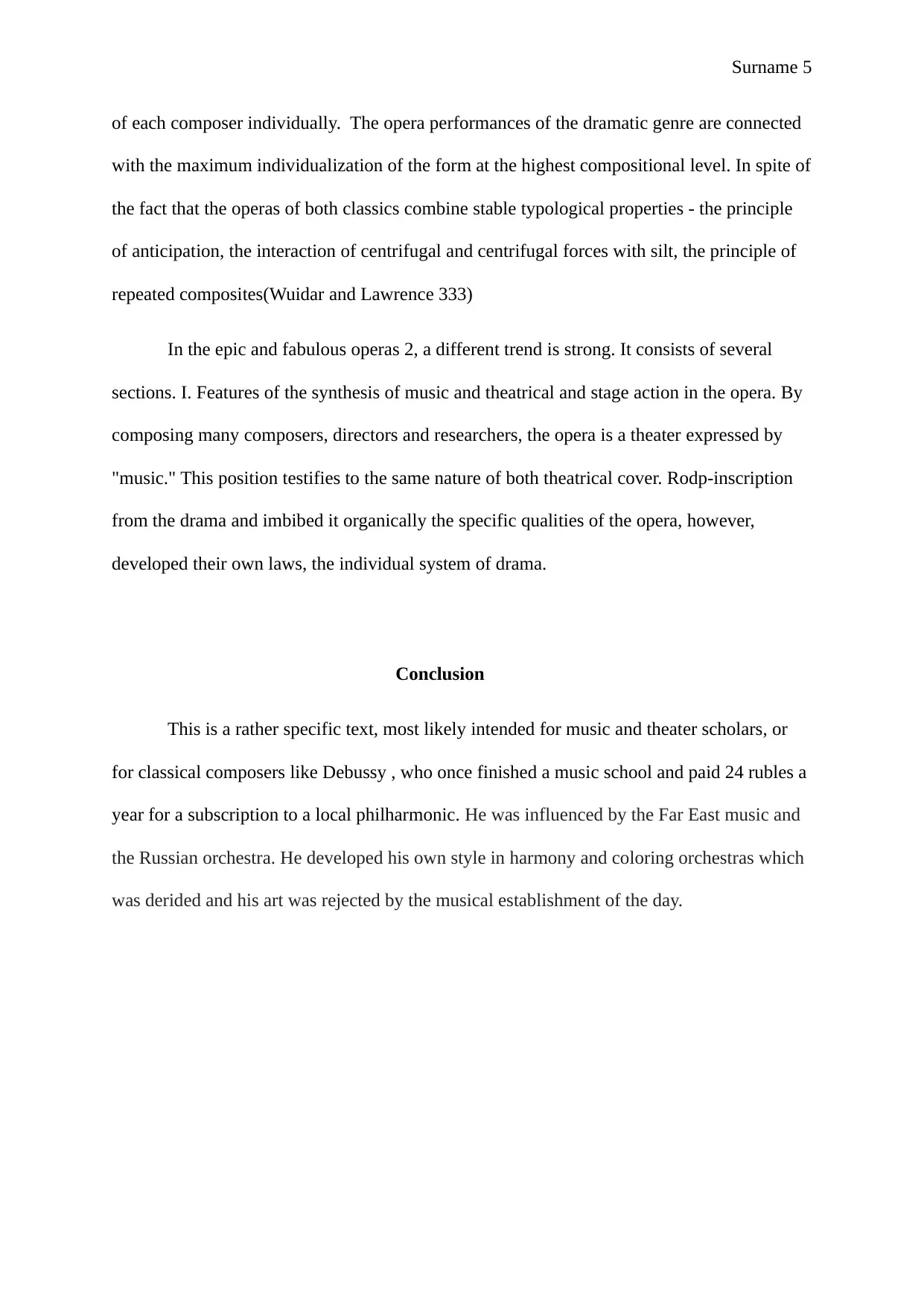
Surname 5
of each composer individually. The opera performances of the dramatic genre are connected
with the maximum individualization of the form at the highest compositional level. In spite of
the fact that the operas of both classics combine stable typological properties - the principle
of anticipation, the interaction of centrifugal and centrifugal forces with silt, the principle of
repeated composites(Wuidar and Lawrence 333)
In the epic and fabulous operas 2, a different trend is strong. It consists of several
sections. I. Features of the synthesis of music and theatrical and stage action in the opera. By
composing many composers, directors and researchers, the opera is a theater expressed by
"music." This position testifies to the same nature of both theatrical cover. Rodp-inscription
from the drama and imbibed it organically the specific qualities of the opera, however,
developed their own laws, the individual system of drama.
Conclusion
This is a rather specific text, most likely intended for music and theater scholars, or
for classical composers like Debussy , who once finished a music school and paid 24 rubles a
year for a subscription to a local philharmonic. He was influenced by the Far East music and
the Russian orchestra. He developed his own style in harmony and coloring orchestras which
was derided and his art was rejected by the musical establishment of the day.
of each composer individually. The opera performances of the dramatic genre are connected
with the maximum individualization of the form at the highest compositional level. In spite of
the fact that the operas of both classics combine stable typological properties - the principle
of anticipation, the interaction of centrifugal and centrifugal forces with silt, the principle of
repeated composites(Wuidar and Lawrence 333)
In the epic and fabulous operas 2, a different trend is strong. It consists of several
sections. I. Features of the synthesis of music and theatrical and stage action in the opera. By
composing many composers, directors and researchers, the opera is a theater expressed by
"music." This position testifies to the same nature of both theatrical cover. Rodp-inscription
from the drama and imbibed it organically the specific qualities of the opera, however,
developed their own laws, the individual system of drama.
Conclusion
This is a rather specific text, most likely intended for music and theater scholars, or
for classical composers like Debussy , who once finished a music school and paid 24 rubles a
year for a subscription to a local philharmonic. He was influenced by the Far East music and
the Russian orchestra. He developed his own style in harmony and coloring orchestras which
was derided and his art was rejected by the musical establishment of the day.
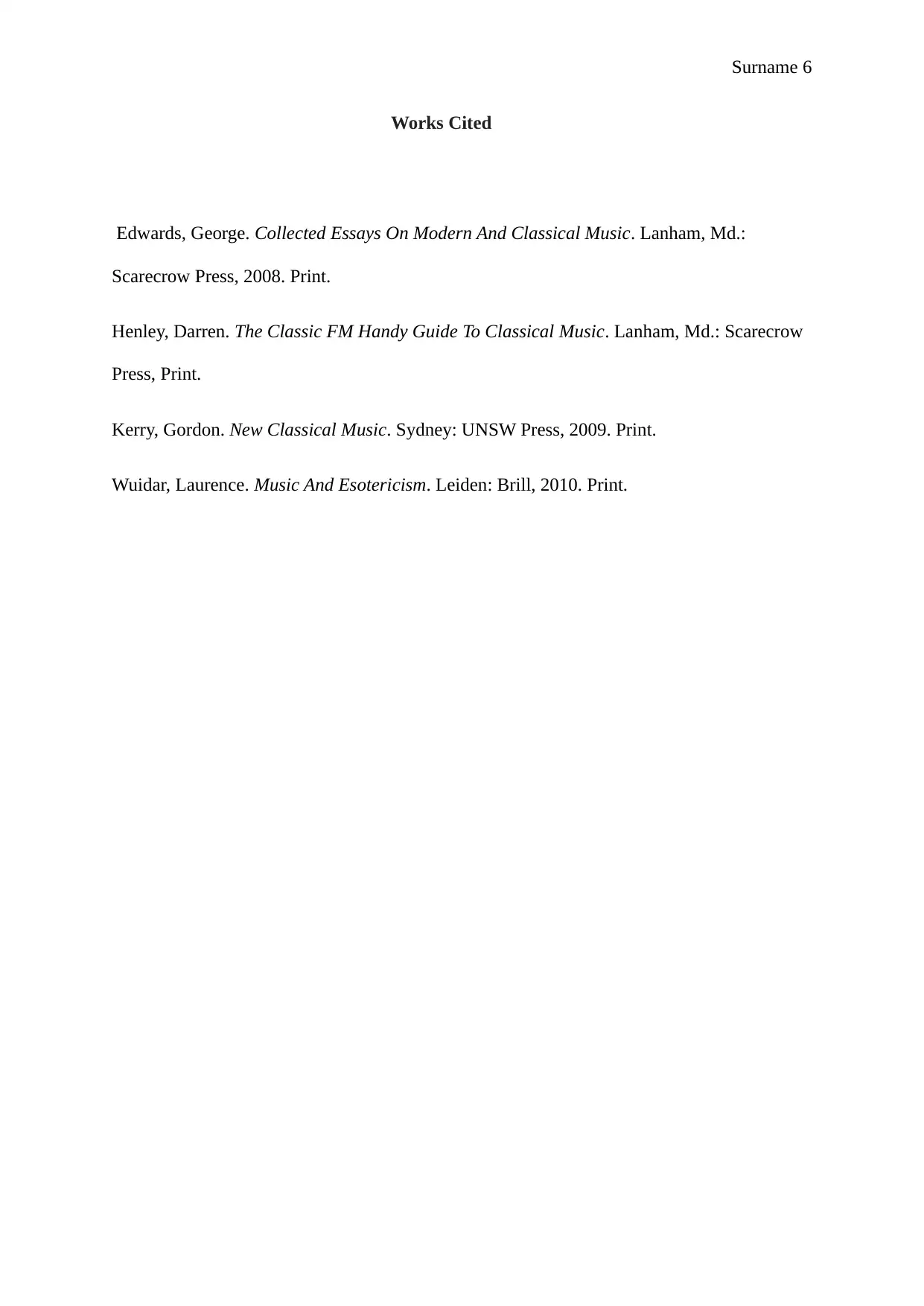
Surname 6
Works Cited
Edwards, George. Collected Essays On Modern And Classical Music. Lanham, Md.:
Scarecrow Press, 2008. Print.
Henley, Darren. The Classic FM Handy Guide To Classical Music. Lanham, Md.: Scarecrow
Press, Print.
Kerry, Gordon. New Classical Music. Sydney: UNSW Press, 2009. Print.
Wuidar, Laurence. Music And Esotericism. Leiden: Brill, 2010. Print.
Works Cited
Edwards, George. Collected Essays On Modern And Classical Music. Lanham, Md.:
Scarecrow Press, 2008. Print.
Henley, Darren. The Classic FM Handy Guide To Classical Music. Lanham, Md.: Scarecrow
Press, Print.
Kerry, Gordon. New Classical Music. Sydney: UNSW Press, 2009. Print.
Wuidar, Laurence. Music And Esotericism. Leiden: Brill, 2010. Print.
⊘ This is a preview!⊘
Do you want full access?
Subscribe today to unlock all pages.

Trusted by 1+ million students worldwide

Surname 7
1 out of 7
Your All-in-One AI-Powered Toolkit for Academic Success.
+13062052269
info@desklib.com
Available 24*7 on WhatsApp / Email
![[object Object]](/_next/static/media/star-bottom.7253800d.svg)
Unlock your academic potential
Copyright © 2020–2025 A2Z Services. All Rights Reserved. Developed and managed by ZUCOL.


